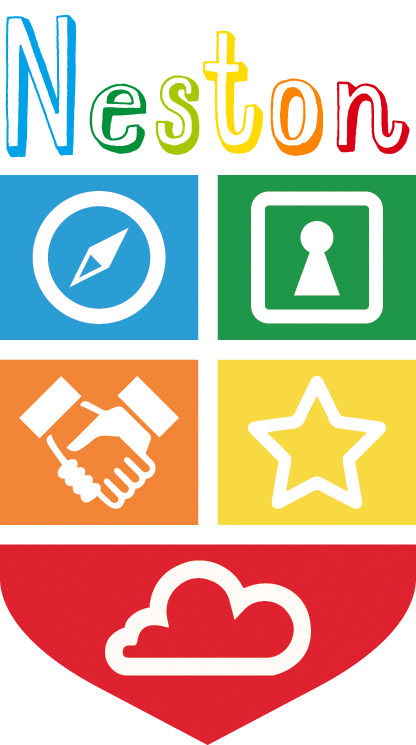English Curriculum
To view the range of high quality texts that we use please click here
Please click here to view the EYFS Curriculum Endpoints
To view our approach to how we teach reading please click here
To view our approach to how we teach writing please click here
To view the way we support a love of reading through our partnership with parents, please see below.
Reading for pleasure is key to the Neston ethos and is supported by whole school events such as author visits, an inviting school library and a team that share their love of books with the children. We carefully select high quality texts to develop children’s language skills and help them develop a love of reading to last a lifetime.
Reading underpins the entire curriculum and children begin their reading journey in Reception with our comprehensive phonics program. Children quickly master the building blocks of words (phonemes), blending them together for successful word reading and segmenting words into their individual sounds for spelling. Teachers can quickly identify children that have not mastered specific sounds and ensure that they have additional practice daily.
Neston uses Collins “Big Cat” reading scheme.
Research shows that when phonics is taught in a systematic and structured way, it is the most effective way of teaching children to read. Ongoing assessment and interventions ensure every child can make progress and become a successful reader.
Neston uses Unlocking Letters and Sounds to teach phonics, which was validated by the DfE in December 2021.
We begin teaching phonics in the first few weeks of Term 1 in Reception and children make rapid progress in their reading journey. Children begin to learn the main sounds heard in the English Language and how they can be represented, as well as learning ‘Common Exception’ words for Phases 2, 3 and 4. They use these sounds to read and write simple words, captions and sentences. Children leave Reception being able to apply the phonemes taught within Phase 2, 3 and 4.
Link to Phase 2 ‘Actions, Images and Letter Formation’ document
In Year 1 through Phase 5a, b and c, they learn any alternative spellings and pronunciations for the graphemes and additional Common Exception Words. By the end of Year 1 children will have mastered using phonics to decode and blend when reading and segment when spelling. In Year 1 all children are screened using the national Phonics Screening Check. In Year 2, phonics continues to be revisited to ensure mastery of the phonetic code and any child who does not meet age related expectations will continue to receive support to close identified gaps. For further details please see the Unlocking Letters and Sounds progression
To ensure no child is left behind at any point in the progression, children are regularly assessed and supported to keep up through bespoke 1-1 interventions. These include GPC recognition and blending and segmenting interventions. The lowest attaining 20% of pupils are closely monitored to ensure these interventions have an impact.
At Neston we promote a 'phonics first' approach and in both our guided reading sessions at school and in the books children take home, texts are very closely matched to a child's current phonics knowledge so that every child can experience real success in their reading. In these crucial early stages of reading we primarily use books from Collins Big Cat and Ransom Reading Stars Phonics, to ensure complete fidelity to the Unlocking Letters and Sounds progression we follow.
Once children progress beyond decodable texts, they move onto our book scheme so that they can continue to progress in their decoding, fluency and comprehension skills to become avid, expert readers.
As soon as children begin to blend the sounds they have learned to read words, they will bring home a decodable reading book at a level that they can read aloud to a parent/carer.
The most important way to support your child with reading is to listen to them read their school reading book at least 5 times per week. By recording their progress in the reading record provided, a dialogue is created with school to ensure your child makes great progress in applying all that they have learned at school. Children will also bring home a Reading for Pleasure book for you to read to them and to enjoy together.
